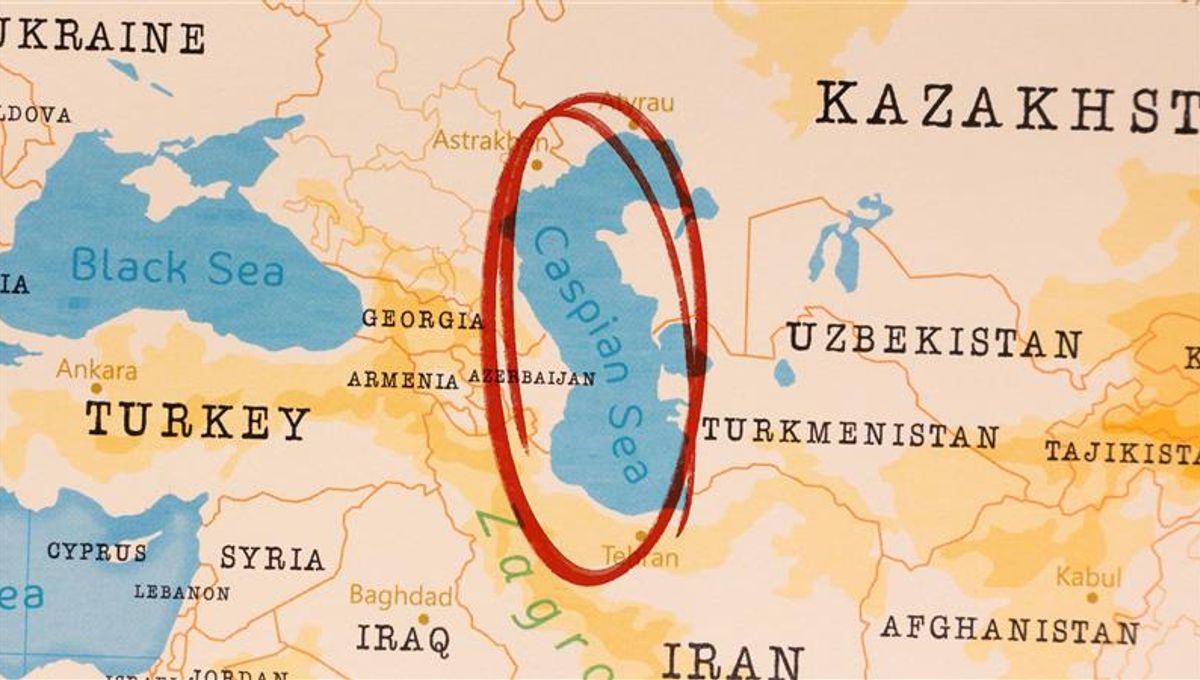
The Caspian Sea is the largest inland body of water in the world, but due to certain peculiarities, there is not agreement on whether it is really a sea or actually a bloody large lake. But while it may appear to be a trivial problem, the answer has significant geopolitical implications which make it a delicate matter.
The Caspian… ocean?
The Caspian Sea is located at a point between Europe and Asia and is straddled by several states, including Azerbaijan, Iran, Kazakhstan, Russia, and Turkmenistan. The water expands over 745 miles (1,200 km) and has a surface area of around 371,000 square miles (143,200 square miles). This gives it a surface area that is almost as big as the country of Japan.
According to ancient Greek and Persian sources, the sheer size of the body of water suggested it was an ocean, which contributed to its name. This argument is further bolstered by the fact that it has a high salinity (salt content), though more so in the south than in the north where freshwater enters from the Volga River. In addition, the water becomes deeper as you travel towards the south. And this is quite a contrast. The northern part of the water can drop to depths of about 5 to 6 meters (16 to 20 feet), but in the south, things can drop to a staggering 1,000 meters (3,000 feet).
The Caspian… freshwater lake?
All these features may make you think we are definitely describing a sea, but it really is a tricky case. The Caspian Sea has some unique features that throw us off a bit. Firstly, there is the simple case that it is completely landlocked and very much inland. The only way to access it, via water, is by the Volga River which flows through Russia, as well as some canals that connect it to the Black Sea, the Baltic Sea and the Sea of Azov.
Although it does have a high salt content, it does not receive this from the open sea and it is actually fed freshwater from several rivers other than the Volga, including the Ural and Kura. But then again, despite this constant flow of freshwater, the sea maintains an average salinity level of about 12 parts per thousand (ppt). This means the waters are saltier than freshwater, but much less so than a typical sea (which usually has a salinity level of around 35 ppt).
These unique qualities have also made the Caspian Sea a home for various species that have adapted to its brackish conditions. These include the Caspian sturgeon, whose eggs form the much sought-after caviar. Then there is also the adorable-looking Caspian seal, which is only found around these waters and is the smallest member of the earless seal family.
However, the Caspian Sea is under threat from pollution and overfishing. And this is where the definition issue comes into play.
Rich resources and geopolitics muddy the waters
Since the fall of the Soviet Union in 1991, the Caspian Sea has become a key geopolitical issue for the surrounding states due to the presence of oil and gas resources in and around the waters. Each state has been involved in various ongoing disputes over territorial waters and the drawing-up of exclusion zones, all of which have been playing out at the cost of the environment.
Each country has invested significant amounts of money in exploiting the natural resources in the area for their own economic purposes. At any given time, patrol boats from the different states lurk along the agreed boundaries of their allotted portions of the water to protect their interests.
At the same time, local fishing communities and the tourist industry continue to trade and operate on the waters, which provide for their livelihoods.
This is why the tricky classification issue, whether the Caspian Sea is actually a sea or a lake, is significant. Without a formal internationally recognized agreement on this matter, the geopolitical issues have been allowed to play out in more traditional geopolitical lines, including coercion, and negotiations led by power politics, rather than international laws.
However, if the state became more involved within the international community, a definition of the Caspian Sea as a legitimate sea would allow the waters to be protected under the same international instruments that protect the world’s oceans, as well as dividing the rights and responsibilities for explosion, protection, and management of the marine ecosystems.
Unfortunately, the states bordering the waters have increasingly withdrawn from international conventions in recent years, in fact even more so than they had just after the fall of the Soviet Union.
Source Link: The Caspian Sea: Is It Really A Sea Or A Lake Or None Of The Above?